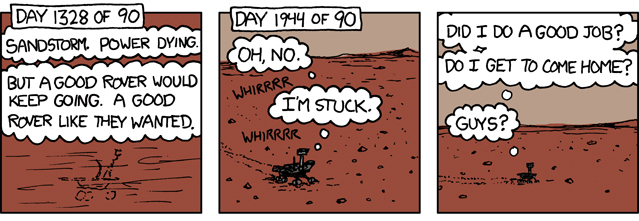The Souls in Our Machines
I recently saw a xkcd strip about the Spirit rover.
I’m notoriously immune to the usual causes that are supposed to make women weep. But tears sprang to my eyes when I saw the strip. Just as I wept while I watched the little robots tending the spaceborne trees in Silent Running; at the launches of the Voyagers; and when I saw the drawing of Sojourner that showed it leaving human footprints on Mars.
These are just instruments. They’re not fluffy, they’re not cuddly. But they represent the best in us – the builders, the gardeners, the explorers.
ETA: My friend Calvin asked an important question in his comment to this entry: “Do you think these robots are pushing our neoteny buttons? The Spirit rover (as well as Wall-E) have the large “eyes” of a child. And the squat proportions of the robots in Silent Running (as well as R2D2) also seem to echo the proportions of a child.”
I considered this possibility. But the Mars rovers and the Voyagers lack several crucial attributes of neoteny: roundness, softness, cooing gurgles.
R2D2 adhered more closely to the neotenic model, and he didn’t arouse these reactions (in me, at least). For me, their roles are what make them so enormously touching — the quiet, uncomplaining, unsung preservation and propagation of supremely “humane” values.
Top, a portion of the xkcd strip Spirit.
Center, Swirl, by Joe Bergeron.
Bottom, a gardener in Silent Running.





I had similar reactions.
Do you think these robots are pushing our neoteny buttons? The Spirit rover (as well as Wall-E) have the large “eyes” of a child. And the squat proportions of the robots in Silent Running (as well as R2D2) also seem to echo the proportions of a child.
Just a thought.
Calvin, I considered this possibility. But they lack several crucial attributes of neoteny: roundness, softness, cooing gurgles.
R2D2 adhered more closely to the neotenic model, and he didn’t arouse these reactions (in me, at least). For me, it was their roles that made them touching — the preservation and propagation of supremely “humane” values.
I’m migrating this to the article proper, because it’s a very important point.
Athena,
I had this response, too: wanted to cry for the rover. Of course, that’s to some extent the tragicomic response Randall Monroe was fishing for, but it’s a real, human response…even if we feel silly about it afterwards.
This reminds me of the age-old human habit of naming and personifying objects upon which rely on intimate and sometimes life-saving or life-enhancing ways. Ships, cars, etc. PCs for some people.
I remember crying at around age 7 or 8 when my Dad traded in our 1950-something Plymouth (with the Indian head hood ornament) for a Chevy station wagon. It was like losing a member of the family for me.
At its core, this phenomenon is animism. It goes very deep into our hard-wiring to project “personhood” onto anything with which we interact in intimate, collaborative ways.
Crying for the Mars rover is an emotional response kindred with talking with “God.”
What wonderful, strange creatures we are!
Blessed Be,
Michael
I tend to believe it is something different. In the case of Silent Running, I, too, was surprised at how much the ending affected me. Something about those little robots tending the garden forever. Almost like they were doing it just in case someone dropped in which you know would never happen. I analyzed my feelings and they are the same type of feelings when I hear a tremendous piece of music (like the 1812 Overture) or an amazing feat of human engineering (like the Brooklyn Bridge). To me the thing in Silent Running that was so beautiful was that Bruce Dern’s character, Freeman, had a vision of making something beautiful in the hope that maybe somebody somewhere would need it or maybe appreciate it. We know no one ever will drop in and certainly the idea of these somewhat people-like beings faithfully tending the gardens even though they themselves don’t know why, is heartbreaking (I’m crying even now), but I think it’s because of what we ourselves go through. We too put forth great efforts that are never appreciated. We identify with these robots. We are feeling sorry for ourselves, that’s why we cry. IMHO.
You know, Sue, I think you hit very close to the central kernel of this emotion.
What Michael said was true: we do tend to invest loved objects with a spirit (from stuffed toys to starships).
But what makes me cry is seeing or imagining these tiny machines doing something faithfully and well, even if nobody is there to appreciate it — especially something that’s noble by any definition, like exploring Mars or watering endangered gardens. That may well explain why I was not affected by R2D2: if anything, too many have witnessed and acknowledged its heroics (in the universe of the movies themselves as well as by the viewers at one remove).
Yet I’m not sure that the tears come because we identify with the robots through self-pity. We actually feel heartache and admiration because they do so without whining. They’re machines, of course, which is where Michael’s animistic identification comes in. When I watch them, it’s more a yearning I feel — to strive in tasks such as theirs, and reach even a fraction of their achievement.
You know somebody is going to find the last dome and Dewey
someday. Don’t give up hope. Bruce Dern – I mean Lowell Freeman – did not die in vain.
I think these tinies are a primer example of the tree falling in the forest: it still falls, and it still makes a sound, even when nobody is there to hear it.
Poul Anderson’s late novel _Genesis_ begins with an
affecting scene in which an astronaut has bonded
emotionally with a robotic exploration vehicle.
Of course, in this SF story the robot is in fact
artificially intelligent. When the robot explorer becomes
trapped by a landslide (on Mercury, I think) the
astronaut risks his life (against the advice of another
AI) to rescue his robot pal before the sun rises.
The astronaut is “rewarded”, in a sense, by being
uploaded as part of a star-bound Mind, and is
reinstantiated as an individual human ages later
for a special mission back to Earth.
http://us.macmillan.com/genesis
Speaking of Anderson, here’s an interesting allegation:
http://io9.com/5390226/did-james-cameron-rip-off-poul-andersons-novella
Even the cover art is highly suggestive.
People noticed the resemblance to Anderson’s Call Me Joe very early, Jim. Worse yet, as I and others noted in our essays about Avatar, Cameron not only recycled everyone else’s stories — he even retreaded his own. Talk of failure of the imagination!
The attachment to sentient AI is not surprising (starting with Asimov’s robot detective). Attachment to non-humanoid shaped things is slightly different in cause, though not necessarily in outcome.
I agree with you, Sue, that the phenomenon is about sorrow over the robots’ unrecognized contributions, and with you, Athena, the emotion is not self pity, but rather grief — a release of pent-up sadness, on behalf of those who labor and suffer and love without recognition for the courage and creativity of their efforts. It is an empathetic response, rather than a self-interested one, at heart.
Exactly, Laura! Your summary term, empathetic response, says it all in a nutshell.
Finally saying goodbye to Spirit:
http://www.planetary.org/blog/article/00003046/
Until our descendants come upon it some day.
Faithful little explorer!
Not like it had much ability to make the choice. :^)
Wait until our first deep space probes which will need real AI come along, then we might see some interesting reactions and real characters!
Plunge into that cravasse with no hope of return just so some organic geology geek can get a better look at some rock layers? Don’t think so, pal. I’m outta here!
True — but it exceeded all expectations.
Yes, unruly AIs (if they ever happen) will be sort of like cats, with stubborn and opaque agendas of their own!